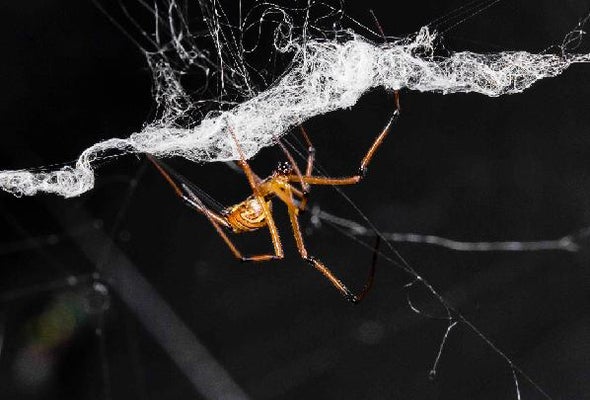(单词翻译:单击)
听力文本
This is Scientific American's 60-second Science, I'm Christopher Intagliata.
For male black widow spiders, finding a mate is risky business. "They have to go on an epic journey."
Catherine Scott, an arachnologist at the University of Toronto.
At the population she studies, on Canada's Vancouver Island, she says the spiders have only a 12 percent chance of surviving their scramble over sand dunes and plants. And "they have very poor eyesight, and they're traveling at night."
So one way males find females is by sniffing, from afar, the pheromone perfume on their webs. But Scott has now discovered an alternative way males find mates: by subjecting the spiders to a race.
"For each male, before he started, we weighed him in on a tiny scale, and we painted him with racing stripes and measured the length of his legs. We had a finish line of pheromone-emitting females.... And we released males at various distances from those females to see whether they arrived at a female's web or not and how fast they got there."

What surprised her was that the males that started farthest—nearly 200 feet away—actually traveled fastest toward females. The reason? They poach the paths of their rivals, who spin continuous silk draglines as they move.
"These spiders are much more adept at walking and running on silk than they are on the ground. So we realized maybe the males that we released far away from the females were encountering these silk highways left by rival males and running along them."
The details are in the Proceedings of the Royal Society B.
And follow-up experiments in the lab confirmed that male black widows are indeed willing to risk a run-in with a rival to win a chance to pass on their genes—a chance that makes it worth traveling along the silk road.
Thanks for listening for Scientific American — 60-Second Science. I'm Christopher Intagliata.
参考译文
这里是科学美国人——60秒科学系列,我是克里斯托弗·因塔格里塔。
对雄性黑寡妇蜘蛛来说,寻找配偶是件危险的事情。“它们不得不经历漫长而艰难的旅程。”
多伦多大学的蜘蛛学家凯瑟琳·斯科特说到。
她说,在她研究的加拿大温哥华岛上的种群中,黑寡妇蜘蛛爬过沙丘和植物的几率只有12%。而且“它们的视力很差,还要在晚间行进。”
因此,雄性找到雌性的方法,就是闻到远处蛛网上的信息素香气。但斯科特现在发现了雄性找到雌性的另一种方法:让雄性参加比赛。
“每只雄蛛出发前,我们都会用小秤给它们称重,再给它们涂上比赛用条纹,并测量其腿长。我们让释放信息素的雌蛛作为终点线。我们把雄性放在离雌性不同距离的位置上,观察它们是否能到达雌性的网,以及它们的到达速度。”
令她吃惊的是,开始时离雌性最远——相距近200英尺——的雄性,实际上接近雌性的速度最快。原因为何?因为它们窃取了对手的路线,这些雄蛛会一边移动一边不停地吐出拖拉丝线。
“这些蜘蛛在蛛丝上行走和奔跑要比在地面上熟练得多。因此我们意识到,也许我们在远离雌性的地方释放的雄性,遇到了雄性对手留下的蛛丝高速路,随后便沿着这些路奔跑。”
研究详情刊登在《英国皇家学会会刊:B辑》上。
实验室进行的后续实验证实,雄性黑寡妇蜘蛛确实愿意冒险与对手竞赛,来赢得将自已的基因传递下去的机会,这是让沿着“丝路”行走变得有价值的机会。
谢谢大家收听科学美国人——60秒科学。我是克里斯托弗·因塔利亚塔。
译文为可可英语翻译,未经授权请勿转载!
重点讲解
重点讲解:
1. at night 在晚间;在夜里;
He was going to college at night, in order to become an accountant.
为了成为会计师,他上夜校学习。
2. subject sb. to sth. 使经受;使遭受;
The Roman Empire subjected most of Europe to its rule.
罗马帝国把欧洲多数地区置于自己的统治之下。
3. be adept at 熟练的;擅长的;内行的;
He's usually very adept at keeping his private life out of the media.
他通常很善于使自己的私生活避开媒体的关注。
4. be willing to do sth. 乐意的;愿意的;
Few firms will be willing to gamble on new products.
很少有公司愿意冒险开发新产品。


